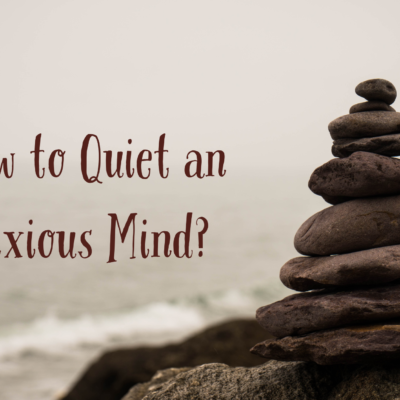How to Quiet an Anxious Mind: Anxiety is a natural response to stress, but when it becomes overwhelming, it can disrupt your thoughts, emotions, and daily life. Learning how to quiet an anxious mind is essential for mental well-being. This article provides actionable strategies to help you regain control, reduce overthinking, and find inner peace.
Also Read:
- How to Stop Overthinking About Someone You Love?
- What Causes Severe Anxiety at Night and How to Handle it?
- How to Keep Your Mind From Racing?
Understanding Anxiety
Anxiety is characterized by excessive worry, restlessness, and a constant feeling of being on edge. It can stem from various sources, including external stressors, unresolved emotions, or even physiological factors. While some anxiety is normal, persistent or intense anxiety requires active management.
How to Quiet an Anxious Mind?
1. Recognize the Signs of an Anxious Mind
The first step in quieting an anxious mind is awareness.
- Common Symptoms: Racing thoughts, difficulty concentrating, physical tension, rapid heartbeat, and irritability.
- Self-Awareness: Pay attention to the triggers and patterns that exacerbate your anxiety. Understanding these can help you take proactive steps to manage it.
2. Practice Deep Breathing
Deep breathing is a simple yet powerful tool to calm your mind and body.
- How It Helps: Slow, deep breaths signal your nervous system to relax, reducing the fight-or-flight response.
- Technique:
- Inhale deeply through your nose for a count of four.
- Hold your breath for four counts.
- Exhale slowly through your mouth for six counts.
Repeat this cycle for a few minutes until you feel calmer.
3. Focus on the Present Moment
Anxiety often stems from worrying about the future or ruminating on the past. Staying present can help alleviate this.
- Mindfulness: Engage fully in the current moment. Focus on your surroundings, sensations, or activities.
- Grounding Techniques:
- 5-4-3-2-1 Method: Identify five things you can see, four you can touch, three you can hear, two you can smell, and one you can taste.
- Progressive Muscle Relaxation: Gradually tense and relax each muscle group in your body, starting from your toes to your head.
4. Challenge Negative Thoughts
An anxious mind often spirals into irrational or exaggerated fears.
- Cognitive Reframing: Question the validity of your anxious thoughts. Are they based on facts or assumptions?
- Ask Yourself:
- What evidence supports this thought?
- What’s the worst-case scenario, and how likely is it?
- How would I advise a friend in this situation?
- Replace Negative Thoughts: Substitute worst-case scenarios with balanced, realistic perspectives.
5. Limit Overthinking with a “Worry Time”
Constantly dwelling on concerns can be exhausting. Create boundaries for your worries.
- Set a Timer: Allocate 15-20 minutes daily as your “worry time.” During this period, jot down your concerns or think about them deeply.
- Move On: Once the time is up, redirect your focus to productive or enjoyable activities.
6. Engage in Physical Activity
Exercise is a proven way to reduce anxiety and improve mental health.
- How It Helps: Physical activity releases endorphins, which combat stress and improve mood.
- What to Do:
- Take a brisk walk in nature.
- Practice yoga or tai chi for mindfulness and relaxation.
- Join a fitness class or engage in a sport you enjoy.
7. Practice Meditation and Mindfulness
Meditation helps train your mind to stay focused and reduces anxiety over time.
- Guided Meditations: Use apps like Calm, Headspace, or Insight Timer to get started.
- Simple Practice:
- Sit comfortably in a quiet space.
- Close your eyes and focus on your breath.
- Acknowledge any intrusive thoughts without judgment and gently redirect your focus to your breath.
8. Create a Soothing Environment
Your surroundings play a significant role in your mental state.
- Declutter: A tidy space promotes a sense of calm and order.
- Use Calming Scents: Aromatherapy with lavender, chamomile, or sandalwood can help reduce anxiety.
- Play Relaxing Sounds: Nature sounds, soft instrumental music, or white noise can create a peaceful atmosphere.
9. Limit Stimulants and Screen Time
Certain habits can heighten anxiety, so minimizing them is crucial.
- Reduce Caffeine: Coffee and other caffeinated drinks can increase restlessness and jitteriness.
- Limit Alcohol: While it may initially feel calming, alcohol can disrupt your mood and sleep.
- Screen Breaks: Prolonged screen time, especially before bed, can over-stimulate your mind. Set boundaries for using electronic devices.
10. Build a Support System
You don’t have to manage anxiety alone.
- Talk to Someone: Share your feelings with a trusted friend, family member, or therapist.
- Join Support Groups: Connecting with others who understand your experience can be incredibly comforting.
- Professional Help: If anxiety persists, consider therapy or counseling. Techniques like Cognitive Behavioral Therapy (CBT) are highly effective in managing anxiety.
11. Adopt a Healthy Lifestyle
Making positive changes in your lifestyle can have a profound impact on anxiety.
- Nutrition: Incorporate foods rich in magnesium, omega-3 fatty acids, and B vitamins, such as leafy greens, nuts, and fatty fish.
- Sleep Hygiene: Maintain a regular sleep schedule and create a bedtime routine to promote restful sleep.
- Stay Hydrated: Dehydration can exacerbate feelings of anxiety, so drink plenty of water.
12. Distract Your Mind
Engaging in activities you enjoy can redirect your focus away from anxious thoughts.
- Creative Outlets: Paint, write, or play a musical instrument.
- Read or Watch Something Lighthearted: Choose uplifting books, shows, or movies.
- Puzzles and Games: Solve crosswords, jigsaw puzzles, or play video games to engage your mind.
13. Practice Gratitude
Focusing on the positives in your life can shift your perspective and reduce anxiety.
- Gratitude Journaling: Write down three things you’re grateful for each day.
- Express Thanks: Share your appreciation with others, whether through words, notes, or acts of kindness.
14. Accept What You Cannot Control
Anxiety often arises from trying to control the uncontrollable.
- Focus on What You Can Change: Identify actionable steps you can take.
- Let Go: Remind yourself that some outcomes are beyond your influence and that it’s okay not to have control over everything.
15. Celebrate Small Wins
Managing anxiety is a journey, and every step forward counts.
- Acknowledge Progress: Recognize your efforts, no matter how small they may seem.
- Reward Yourself: Treat yourself to something you enjoy when you achieve a milestone.
Conclusion
Quieting an anxious mind takes practice and patience, but with the right tools and mindset, it’s achievable. By incorporating techniques like mindfulness, physical activity, and healthy habits into your daily routine, you can reduce anxiety and improve your overall well-being. Remember, you’re not alone in this journey, and seeking support from loved ones or professionals can make a world of difference.








